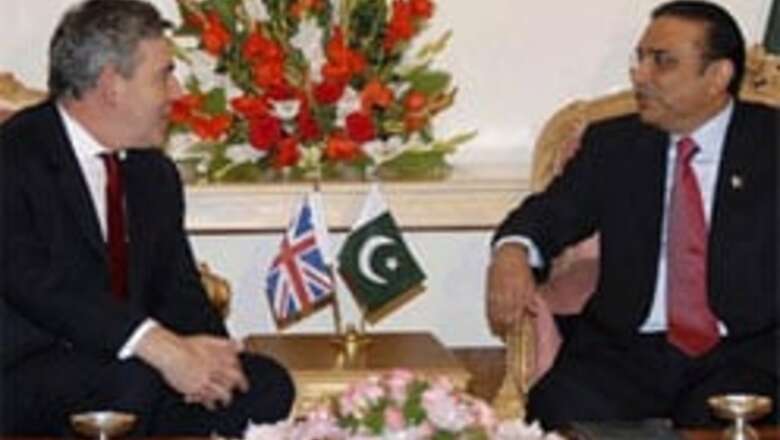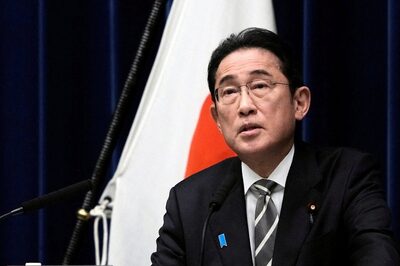
views
Islamabad: British Prime Minister Gordon Brown pledged more counter-terrorism help to the Pakistani government, revealing that three-quarters of terror plots investigated in Britain linked back to al-Qaida supporters in Pakistan.
Brown travelled to Afghanistan, India and Pakistan over the weekend to visit British troops and bolster cooperation between India and Pakistan in the wake of the deadly Mumbai attacks that killed more than 160 people.
But his strongest message was delivered Sunday to Pakistan's President Asif Ali Zardari, whose wife Benazir Bhutto died last year in an attack launched by extremists.
Zardari faces a daunting challenge of tackling poverty and extremism in Pakistan as he tries to shore up support in the tribal regions and within his own government. Bhutto repeatedly alleged that Pakistan's security services had long-standing ties to extremist elements.
"The time has come for action and not words, and I want to help Pakistan and other countries root out terrorism," Brown told reporters in a joint news conference with Zardari.
Brown said Britain promised Pakistan counter-terrorism equipment for detecting bombs and explosives at airports. Britain also pledged $9 million to lure youths away from extremist activities by offering them educational materials and programs.
Brown discussed similar assistance with Indian Prime Minister Manmohan Singh earlier Sunday, including a better system for sharing intelligence.
Although British and American intelligence agencies helped thwart a trans-Atlantic airliner attack in 2006 — a plot that had links to Pakistan — fewer success stories have been attributed to intelligence information out of Pakistan or India.
Pakistan and India have fought three wars since independence from Britain in 1947 — two of them over Kashmir, whose status has emerged as a recurrent theme in the radicalization of young British Muslims.
Despite a peace process that began in 2004, tensions remain high and intelligence sharing has been limited.
Investigations have pointed to the Mumbai attacks being perpetrated by the Pakistan-based Lashkar-e-Toiba Islamic group, straining relations even further.
Brown echoed the assertion, saying the group has long been on Britain's radar.
Abdullah Ghaznavi, Lashkar's chief spokesman, denied the allegation, saying his group targets Indian defence forces and installations to force India out of Kashmir.
"We reject the claim of British Prime Minister Gordon Brown and urge him to independently investigate this matter instead of relying on false and fabricated evidence provided by India," Ghaznavi told The Associated Press in a call on Sunday from an undisclosed location.
"This is a jihad and it will continue," he added.
He also claimed his group has "no direct or indirect links" with the Taliban or al-Qaida.
"We neither finance them nor support them," he said.
Brown said there was a "chain of terror" emanating from Afghanistan and Pakistan.
"I told President Zardari that three fourths of the most serious terror plots investigated by British authorities have links to al-Qaida in Pakistan," he said.
Britain has a large South Asian population. Most of its some 2 million Muslims are of Pakistani or Kashmiri origin.
The British suicide bombers who killed 52 London commuters in 2005 had family links to Pakistan, and Indian-born Dhiren Barot was jailed in Britain in 2006 over plots to bomb the New York Stock Exchange, other US financial targets and landmark London hotels.
Barot, who was raised in the UK had converted to Islam at age 20 and been regarded by British intelligence as a key al-Qaida figure. He had traveled to Kashmir in 1995 to fight against Indian forces.
Pakistan has also seen recent terror attacks. Some 54 people were killed in September a truck bomb exploded, gutting the Marriott hotel in Islamabad.
"All of us suffer when terrorists are active and are able to impose their will," Brown said.
Brown said he asked Singh if he would allow British authorities to question the only known surviving gunman in the Mumbai massacre, and asked Zardari for similar cooperation with arrested suspects. Neither leader publicly responded to the request.
One British national and two people with dual nationality were killed in the attacks.
According to India, the 10 terrorists — nine of whom were killed — were from Pakistan, as were the handlers, masterminds, weapons, training camps and financing.
Pakistan has arrested some suspected plotters and shut offices of a charity allegedly linked to Lashkar, but refuses to do more unless India provides more evidence to aid in prosecutions.




















Comments
0 comment